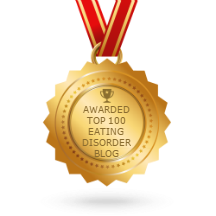- Home
- About
-
Services
- Therapy
-
Eating Disorder Trainings
>
- Clinical Approaches To Treating Body Image Issues
- Clinical Approaches To Treating Bulimia & Binge Eating Disorder
- Finding Freedom From Binge Eating
- Finding Freedom From Anorexia
- Supporting A Loved One With An Eating Disorder
- Eating Disorder Recovery Road Map
- Healing From Body Hate And Practicing Self-Compassion
- Common Questions
- Blog
- Press
- Contact
|
In a society that promotes an emphasis on appearance, dieting, busyness, and garnering social media “likes,” it can be easy to lose sight of the things that truly matter.
We are culturally conditioned to believe that our worth is measured in our weight, appearance, grades, social media following, and our wealth. However, these things are not a barometer of our inherent worthiness or value. As a therapist in private practice, I find that it can be very helpful to explore with my clients their true values. This helps them to put things into perspective and can motivate them to “put in the work” when it comes to challenging themselves to step out of their comfort zones. An Exercise: The following is a brief exercise that you can do to begin to clarify your values, which is adopted from “The Happiness Trap” by Dr. Russ Harris.
Another Exercise: The following is another exercise to help you to explore your values.
What Do You Want to Be Remembered For? It can also be helpful to think about what you would like to be remembered for. What kind of legacy would you like to leave? I have yet to see an obituary, which praised someone’s “six-page abs,” “social media followers,” or “thinness.” Thinking about how you would like to be remembered is one way to clarify whether you are living in alignment with your values. Additionally, it can be helpful in terms of putting things in your life into perspective. A palliative care nurse, Bronnie Ware, shared the five most common regrets of the dying, which were:
It’s important to note that there is nothing in there about wishing they “ate cleaner,” “worked harder,” “had a six-pack,” or “got more followers on Instagram.” At the end of our lives, these things which society places so much significance on, aren’t important. If you are struggling with a mental health concern, which makes shifting your focus from these things challenging, please reach out for professional help. Seeking help when you are struggling is a sign of true strength, not weakness. We are only given a short time on this earth and the things that we do matter. Ultimately, it is our relationships, the way that we pursue our passions, how kindly we treat ourselves and others, and standing up for what we believe in, which actually brings a sense of meaning to our lives. Jennifer Rollin, MSW, LCSW-C: is an eating disorder therapist in private practice in Rockville, Maryland. Jennifer specializes in helping adolescents and adults struggling with eating disorders, body image issues, anxiety, and depression. Jennifer offers eating disorder therapy to individuals in Maryland and D.C. and eating disorder recovery coaching via phone/Skype.
2 Comments
As a therapist in private practice specializing in helping adolescents and adults struggling with eating disorders, body image issues, depression, and anxiety, in Rockville, Maryland, I employ a variety of strategies to help my clients to reclaim their lives and uncover a sense of meaning. I tailor treatment to each person, however I often enjoy using elements of cognitive behavioral therapy (CBT) and dialectical behavioral therapy (DBT). For those who are struggling with an eating disorder, depression, anxiety, or another mental illness, there are often a variety of unhelpful urges that they experience. For example, people who are experiencing depression may feel the urge to isolate from others. Individuals who are struggling with anxiety might experience the urge to avoid situations that cause them to feel anxious. People who are suffering from eating disorders may experience the urge to avoid events or social occasions that involve food. These urges come from a good place, as the individual is often trying to “feel better.” However, in the long-run they only serve to make the person feel even worse. One DBT skill that can be very useful is called “opposite action.” The first step is to identify and name the emotion that you are experiencing. The next part is to determine whether the emotion (including it’s intensity and duration) “fits the facts of the situation.” Additionally, a person can ask themselves whether acting on the urge will be effective in the long-term. Then, based on these answers, a person decides whether to act on their urge or to do an action that is opposite to the urge. An Example of Opposite Action Emotions are important in that they provide us with information and signals about things to pay attention to in our lives. There are times when an emotion “fits the facts of a situation” and motivates us towards effective action. For instance, feeling anxiety about an important exam could serve as a motivator to study. Or feeling anxious while walking home alone at night could help someone to maintain a better awareness of their surroundings. However, there are times when an emotion “does not fit the facts of the situation” and when acting on an emotional urge is not effective. For instance, feeling intense anxiety about eating dinner at a restaurant does not “fit the facts of the situation,” and could cause someone to feel the urge to avoid socializing and going out to eat. Over time, this avoidance behavior only serves to make the anxiety worse. Additionally, it could start to negatively impact an individual’s relationships. In this instance, it would be helpful to note that you are experiencing the urge to avoid eating out and to the take an “opposite action,” which is more in alignment with your life values. For instance, pushing yourself to have meals out at a restaurant (despite feeling afraid), would be taking an opposite action. Seek Help If you are struggling with a mental illness and are having trouble putting this exercise into practice, it’s so important to reach out for help from a trained professional. Seeking help when you are struggling is a sign of true strength, not weakness. Additionally, it’s important to note that behavior change can take time. I often ask that clients begin to challenge themselves in gradual and manageable steps. Further, it’s helpful to be compassionate with yourself, wherever you are in your healing journey. If you are interested in learning more about DBT, I’d highly recommend checking out The DBT Skills Workbook. Jennifer Rollin, MSW, LCSW-C: is an eating disorder therapist in private practice in Rockville, Maryland. Jennifer specializes in helping adolescents and adults struggling with eating disorders, body image issues, anxiety, and depression. Jennifer offers eating disorder therapy to individuals in Maryland and D.C. and eating disorder recovery coaching via phone/Skype. This article was originally featured on The Huffington Post. |
About MeI'm an eating disorder therapist in private practice in Rockville, MD. Archives
June 2024
|



 RSS Feed
RSS Feed
